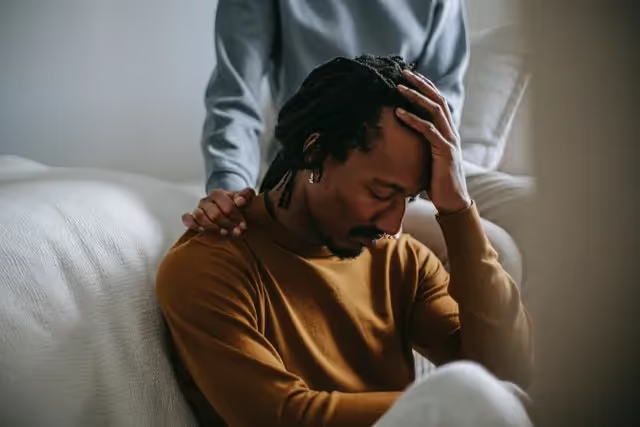Men have a more difficult time accepting the reality of depression or recognizing its symptoms.This is because when they're angry, they tend to mask their...

Men have a more difficult time accepting the reality of depression or recognizing its symptoms.
This is because when they're angry, they tend to mask their emotions, allowing their depression to present in anger and irritability.
So, what are the signs of depression in men?
There are various signs of depression in men which includes changes in their thoughts, feelings, behavior, and even physically.
For example, a man may feel angry, sad, hopeless, indecisive, or guilty.
A man may think negative thoughts such as suicidal thoughts, or your life is not worth living.
A man may behave differently like not going out with friends, not being able to concentrate, or behaving recklessly.
Below shows the signs of depression in men and how to manage them.
Anger is an emotional sign of depression in men.
It's a problem when it turns into hostility, outbursts, or even violent altercations.
One can manage anger by first recognizing the signs.
It can help you take action before it becomes a problem.
Your heart beating faster or fist clenching are physical warning signs to look out for.
When you notice these warning signs, take quick action to prevent yourself from doing or saying things that would cause more harm.
If your anger is giving you problems and you're having trouble controlling it, you should seek professional help.
Also, play some music to take your mind off your feelings.
Sadness can be the result of an unexpected change or a warning that you need to make changes in your life.
Go outside and meet people.
Despite your heartbreaking sadness, life goes on as usual.
A change in scenery can be a wonderful way to manage sadness.
Accept your sadness.
You can cry if you feel like you need to.
Get help immediately if your sadness turns into depression.
Call a friend if you feel the frustrations piling up, or consider therapy if your sadness gets in the way of your daily routine.
Make time for activities you enjoy with people who are important to you because it alleviates the feelings of isolation that are frequently associated with sadness.
Allow hope and light to shine through.

If you find it difficult to reframe hopeless thoughts, learn how to be gentle with yourself.
Never forget to understand that no matter how unjust or painful a loss or change is, the future holds many more kind and happy moments.
Practice self-care and positive self-talk, and be grateful for what you have.
Being hopeless can make you feel numb, and when you feel numb or emotionless, you tend to harm yourself or commit suicide.
If you notice these signs, don't hesitate to call for help.
Consider what you could gain from having hope and start acting as if you were hopeful.
Meet new people, get a new job.
Do all those things even if you don't think it will work.
This is another emotional sign of depression in men.
Although mistakes are normal to human growth, guilt creeps in and stakes out space in your consciousness which can cause plenty of emotional and physical turmoil.
It is important to acknowledge your guilt because refusing to do that, might temporarily keep it from spilling into your everyday life.
Forgive yourself and also, practice self-acceptance, trust yourself and do things differently in a good way.
Even if it's hard to talk to someone, talk to people you trust because sharing difficult feelings often releases tension.
This is a behavioral sign of depression in men.
One can overcome a lack of concentration by engaging in mental exercises like meditation and listening to meditation music.
Playing concentration games like rhyming word games, etc, is a fun way to enhance your concentration.
You can manage a lack of concentration by rethinking/changing your environment. Make changes to your environment to make concentration easier.
Physical activities, dietary habits, and weight can all affect how well you perform and concentrate.
So exercise regularly and eat a balanced diet.
It is more difficult to sleep when you're depressed.
And the more tired you are, the more difficult it is to overcome depression.
You can overcome a lack of sleep by consulting your doctor about any sleep issues or depressive symptoms.
You will sleep longer and better if you develop good sleep hygiene.
A few adjustments to your bedtime routine can make a significant difference.
Since depression can cause you to ruminate, keeping you awake all night, you should try to meditate and relax.
This will help you calm your mind and make you fall asleep.
Try to forget your fears, take a step back, and tell yourself, that you can become a decisive person.
Also, learn to trust yourself and believe that you're good enough, especially if you're a perfectionist.
Another way to defeat indecisiveness is never to obsess about the outcomes of your decisions.
Writing down your decisions enables you to link and visualize concepts and results, assisting you in making better-informed decisions.
This is a mental sign of depression in men.
It is very common but can be frightening and confusing.
Think of some of the things that made you feel better in the past when you were dealing with similar issues.
Consider all the motivations for living, write them down and remind yourself about them when you're feeling down.
Avoid drugs and alcohol, and seek professional help if it persists.
This is a physical sign of depression in men and a common nutritional challenge.
Choose foods that are enjoyable to eat and have a pleasant aroma, and plan your meals the day before eating them.
Have a better sleep schedule and you can also take medications prescribed by the doctor to increase your appetite.
Adding more calories to your meals is another strategy to increase your appetite, and ensure you're eating enough during the day.
Practice self-care because if you're not taking care of yourself, both your body, mind, passions, and interests will suffer.
So take care of yourself.
Find a friend with similar hobbies/interests so that you'll be motivated.
Consider why you initially enjoyed it because it may help you get back in touch with your passions and abilities.
You may need to seek professional help if it persists.
It is important to identify the signs of depression in men and take action in overcoming them.
Depression becomes a much more manageable part of the human experience when treated with talk therapy, medication, or the two of them.
If you notice your loved one is experiencing symptoms of depression, don't hesitate to contact a mental health professional.
This is the best step to take in order to get better.
Amy Morin (2021). 9 Things to Do If You Feel Hopeless. Available from: https://www.verywellmind.com/9-things-to-do-if-you-feel-hopeless-5081877
Amy Morin (2021). Anger Management Strategies to Help You Calm Down. Available from: https://www.verywellmind.com/anger-management-strategies-4178870
Amy Morin (2021). Coping With Sleep Disturbances During Depression. Available from: https://www.verywellmind.com/coping-with-sleep-disturbances-during-depression-4161015
Crystal Raypole (2020). Guilt Makes a Heavy Burden. Don't Let It Drag You Down. Available from: https://www.healthline.com/health/mental-health/how-to-stop-feeling-
Hannah Nichols (2017). Five ways to boost concentration. Available from: https://www.medicalnewstoday.com/articles/320165
Healthline Editorial Team (2017). 5 Steps for Overcoming Indecision. Available from: https://www.healthline.com/health/5-steps-overcoming-indecision
Joshua Miles (2019). How To Manage Feeling Sad. Available from: https://welldoing.org/article/how-manage-feeling-sad
Kimberly Holland (2019). How to Control Anger: 25 Tips to Help You Stay calm. Available from: https://www.healthline.com/health/mental-health/how-to-control-anger
Maria Rodale (2014). 21 Ways to Deal with Sadness. Available from: https://www.huffpost.com/entry/21-ways-to-deal-with-sadn_b_5803672/amp
Vidya Sury (2021). How to deal with sadness (15 coping strategies). Available from: https://vidyasury.com/2021/05/how-to-deal-with-sadness.html
Therapy provides many benefits for people battling depression. Research has shown that cognitive-behavioral therapy (CBT) is particularly effective in managing depressive symptoms. In addition, therapy can teach healthy coping skills and provide emotional support during difficult times. It may also be used as part of a comprehensive treatment plan which includes medication as well as lifestyle changes such as regular exercise and improved nutrition.
Yes! There are many effective natural remedies that may be beneficial in managing depressive symptoms, such as participating in regular physical activity, changing your diet, getting adequate sleep, practicing relaxation techniques like yoga or meditation, journaling about your feelings/thoughts/emotions, seeking out social activities/support groups with other individuals struggling with similar issues
Ignoring depression can exacerbate symptoms and make it more challenging to manage over time. This can result in a negative impact on your personal, professional, and social life, leading to feelings of isolation and even thoughts of self-harm or suicide.
Yes! In fact, it's encouraged that you open up to your therapist so they can gain deeper insight into your individual situation and develop the most effective treatment plan possible that works best for you. Your therapist is there to serve as an unbiased source of support who will respect any thoughts or feelings shared within the session without judgment or criticism.
There are many helpful resources available, including support groups, online forums, books and websites dedicated to mental health and wellness. Connecting with other people struggling with the same issue can be especially beneficial. Additionally, talking to a trusted friend or family member can provide much-needed social support during difficult times.
The duration of depression counseling varies for each individual, depending on the severity of their depression and their progress in therapy. Our therapists will regularly assess your progress and adjust your treatment plan as needed.